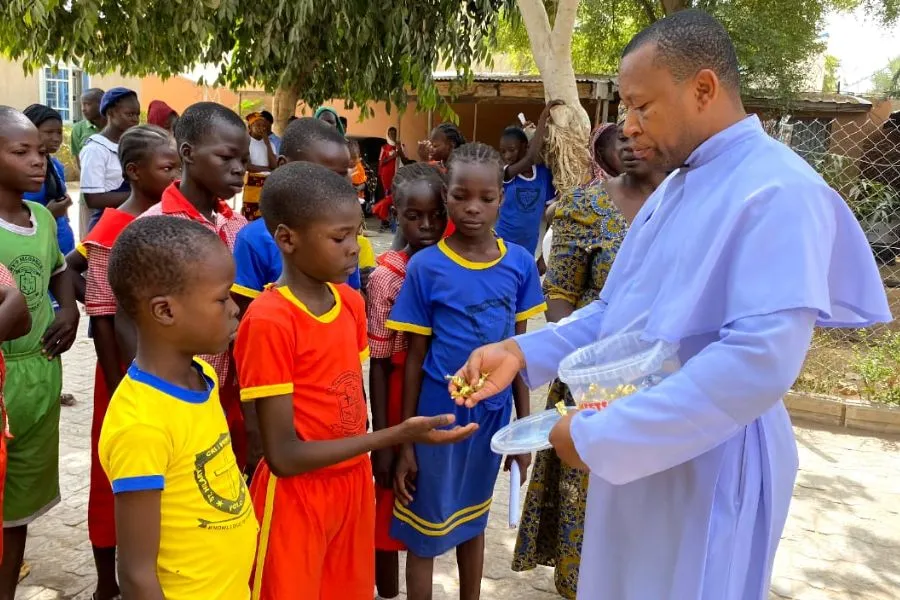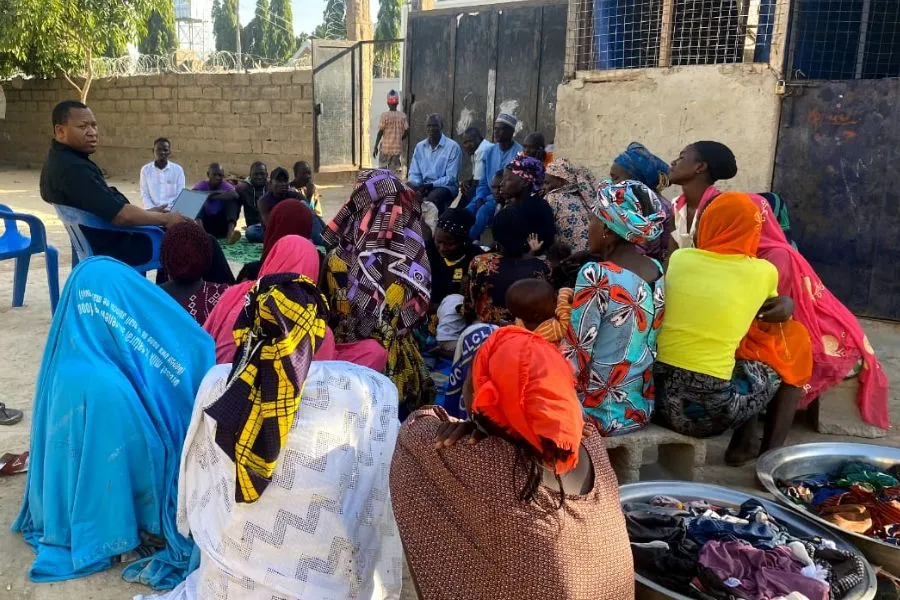It is Fr. Fidelis’ traumatic near-death experiences that led him to develop a deep passion for accompanying those who have had similar experiences.
Fr. Fidelis in the Director of the Human Resource and Skills Acquisition for Trauma Healing Center where he accompanies severe cases of victims of attacks by Boko Haram and the Islamic State West African Province (ISWAP).
The Catholic Priest is one of the two Clinical Psychologists at the facility that was established by the Diocese of Maiduguri to also equip survivors of violent attacks in Maiduguri with skills to start living with dignity.
 A section of the Human Resource and Skills Acquisition for Trauma Healing Center in the Catholic Diocese of Maiduguri Credit: Aid to the Church in Need International
A section of the Human Resource and Skills Acquisition for Trauma Healing Center in the Catholic Diocese of Maiduguri Credit: Aid to the Church in Need International
Fr. Fidelis started by ministering to women in IDP camps who were widowed when militants killed their husbands.
(Story continues below)
“When the militants attack a community, they kill all the men and go away with young women who are forced to convert to Islam and are married off to the fighters. Those who refuse to convert to Islam are used as sex slaves. They also perform domestic chores for the wives of the militants,” he says.
In 2020, the center sent an appeal for finances to the Catholic charity and Pontifical foundation, Aid to the Church in Need (ACN) International, which funded the facelift of the center.
Today, the center has qualified staff that offers trauma therapy to victims of militant attacks, including those escaping from Boko Haram captivity.
People with post-traumatic symptoms that include sleeplessness, unexplained illnesses, physical injuries, and nightmares, among others, walk into the facility and embark on a healing journey individually and in group counseling sessions that encourage interaction.
The center also has a skills acquisition section that equips beneficiaries with occupational competencies in food processing, sewing, and shoemaking, among other skills, to help them back on their feet.
Fr. Fidelis who completed his studies in Clinical Psychology from the Gregorian University goes around the Diocese of Maiduguri, training members of the Clergy, teachers, Catechists, and other Laity on child protection and safeguarding.
He has also participated in multiple programs, including the Trauma Healing for members of the Clergy, women and men Religious and the Healing of Healers, which was organized for 20 Priests in Maiduguri in early May.
The Nigerian Catholic Priest told ACI Africa that the suffering of the people inspires him in his work every day.
“I have seen how much my people have suffered. I believe this is my calling. These people need someone to journey with them, to give them hope, and to constantly show them the face of Jesus amid their suffering,” Fr. Fidelis says.
“I feel the urgent need to spend my life giving hope and passing on the skills that God blessed me with to the people who are interested in accompanying those who have been wounded,” he further says, adding that the Eucharist and daily adoration of the Blessed Sacrament rejuvenates him in his work.
Highlighting some of the challenges at the Catholic trauma healing centre, Fr. Fidelis says, “Funding is our biggest challenge. The needs are so staggering and we can’t meet all of them.”
“We are still receiving people who were kidnapped by Boko Haram nine years ago, and have delivered children who have had adverse childhood experiences and must be taken care of,” the Nigerian Catholic Priest added.
The member of the Clergy of Maiduguri Diocese also underlined the need to provide more capacity building at the center, including widescale training of psychosocial care experts.
Agnes Aineah is a Kenyan journalist with a background in digital and newspaper reporting. She holds a Master of Arts in Digital Journalism from the Aga Khan University, Graduate School of Media and Communications and a Bachelor's Degree in Linguistics, Media and Communications from Kenya's Moi University. Agnes currently serves as a journalist for ACI Africa.
 Credit: Fr. Joseph Bature Fidelis
Credit: Fr. Joseph Bature Fidelis




 A section of the Human Resource and Skills Acquisition for Trauma Healing Center in the Catholic Diocese of Maiduguri Credit: Aid to the Church in Need International
A section of the Human Resource and Skills Acquisition for Trauma Healing Center in the Catholic Diocese of Maiduguri Credit: Aid to the Church in Need International


